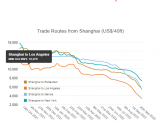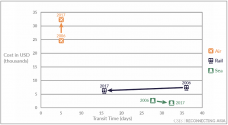now, the hawks in Washington want to impose sanctions on Algeria for looking to join BRICS. This will only push Algeria closer to China.
You are using an out of date browser. It may not display this or other websites correctly.
You should upgrade or use an alternative browser.
You should upgrade or use an alternative browser.
Shanghai Cooperation Organisation (SCO) and Global South strategic cooperation
- Thread starter Strangelove
- Start date
I don't fully understand the logic of sanctioning these nations that are candidates to join. Isn't that just destroying their existing ties to the West and hence forcing them to join BRICS+/SCO/etc.? Only by maintaining those economic/trade/financial ties and instead just verbally threatening to end those ties, would leverage be created. It's one of those situations where the threat holds all the power but actually executing would create your own least wanted outcome. Perhaps this letter is the verbal threat, and it is meant to give leverage for Blinken to use against Algeria. Knowing congress, I somehow doubt it though. I am more inclined to believe they are sending the letter to Blinken specifically to achieve that outcome of sanctions.
Cryto relies on blockchain tech but are much more than blockchain. Just because something leverages blockchain tech doesn’t mean it has anything to do with cryptoare you comparing the general Defi networks vs the centralized e-currency. The idea of using ledger and blockchain are all crypto concepts. The idea of using technology to improve efficiency of financial transaction is a crypto concept. You don't have to be a crypto token like USDT to be considered using crypto technology. Even when you trade on Binance, you are not dealing with decentralized network, but a central limit order book.
No, it is the energy cost. It is simple physics. More energy is needed to move things on land than on water.If you look at this, rail freight prices can go up and down due to demand. Same with shipping. I think part of the reason why rail freight is more expensive is due to lack of supply. If you add more rail lines, it's entirely possible cost of rail freight will be competitive with shipping. There is a large Capex in building rail, but the actual operating costs shouldn't be that high.
No, it is the energy cost. It is simple physics. More energy is needed to move things on land than on water.
Yes
Plus container ships weigh 200,000+ tonnes these days. It needs one set of crew (working in shifts) and a single propulsion system
But a single freight train is realistically a maximum of 5000 tonnes.
The true advantage of train is that is significantly faster. The ship might need to cruise 5-10 days more,consuming vast amounts of energy to reach it's destination. Maybe a reload to local train services will be needed. Some chinese inland ports are launching over 20 freight trains a week.Yes
Plus container ships weigh 200,000+ tonnes these days. It needs one set of crew (working in shifts) and a single propulsion system
But a single freight train is realistically a maximum of 5000 tonnes.
The true advantage of train is that is significantly faster. The ship might need to cruise 5-10 days more,consuming vast amounts of energy to reach it's destination. Maybe a reload to local train services will be needed. Some chinese inland ports are launching over 20 freight trains a week.
Yes, the train competes on speed against an airplane
Also, a ship does use more energy than a train. But because the ship carries so much more cargo, less energy is used per container.
No, it is the energy cost. It is simple physics. More energy is needed to move things on land than on water.
Well, there is a lot of labor costs at the ports. Even major ports like Long beach can only handle so much freight at a time. During the worst jam ups in the past 2 years, container ships were waiting weeks at a time outside of major ports because there is just not enough workers and space to handle all those containers. That's a lot of wasted energy. And once you get it to the port themselves, it often takes long time to get them onto trucks to get hauled away. Trains will simply carrying containers closer to energy destination and won't have the same central point of jams that you get at those mega ports.
Some examples here on cost:
interesting however.A 40-foot container can hold 22,000 kg of goods. By train, the cost would be around USD 8,000. By sea, the same load would cost around USD 4,000 and by air USD 32,000.
and alsoAt the beginning of 2020, it cost around $2,000 to ship a container from China to Europe. Now, some companies are being quoted up to $14,000.
Cost-wise, moving freight in long distances is faster and more affordable. For instance, moving cargo from China to any part in Europe takes less than 18 days via rail but it takes 44 days to do so by sea. Shippers who opt for rail transport are able to have 10-40% more savings.
Not straight forward. Cost can vary based on start/end destination. if it's directly from Shanghai to Amersterdam, that would be cheaper via shipping than Xi'an to Hungary. Also depending on how jammed up the port is, that would add significantly to cost.
I maintain that if you have enough rail options, then the lines have to compete against each other and have to lower their costs. In that case, central/southwest China to Central/Eastern Europe would be competitive to shipping + trucking.
Last edited:
Well, there is a lot of labor costs at the ports. Even major ports like Long beach can only handle so much freight at a time. During the worst jam ups in the past 2 years, container ships were waiting weeks at a time outside of major ports because there is just not enough workers and space to handle all those containers. That's a lot of wasted energy. And once you get it to the port themselves, it often takes long time to get them onto trucks to get hauled away. Trains will simply carrying containers closer to energy destination and won't have the same central point of jams that you get at those mega ports.
Major ports in Asia are almost completely automated these days.
That is the future for all ports.
A ship at anchor consumes almost no energy.
Ports don't have enough workers or space because there hasn't been the investment in capacity.
Railways face the same issue of lack of capacity, because the tracks can only physically accommodate a certain number of trains.
The equivalent in the seaborne world would be a port that ONLY allows prebooked ships on a fixed schedule which matches the port's capacity, so there won't be any queues.
But ports do accept more ships than their capacity and can allow those ships to queue outside the port.
Some examples here on cost:
interesting however.
and also
Not straight forward. Cost can vary based on start/end destination. if it's directly from Shanghai to Amersterdam, that would be cheaper via shipping than Xi'an to Hungary. Also depending on how jammed up the port is, that would add significantly to cost.
I maintain that if you have enough rail options, then the lines have to compete against each other and have to lower their costs. In that case, central/southwest China to Central/Eastern Europe would be competitive to shipping + trucking.
These transport cost comparisons are not representative, as we have to look at the costs pre-pandemic.
The cost of rail is pretty much stuck where it is. In 2017, Rail was about 3x more expensive than Sea and that is what we can expect once the port bottlenecks work themselves out, which we're already seeing below. More frequent train services from China to Europe won't really reduce the cost much, but it will decrease delivery times so that rail can be justified against air/sea.


Isn't that the benefit of rails is for transportation between non coastal area e.g Chengdu to East Europe (practically non coastal since it's far away from major port like Rotterdam).Major ports in Asia are almost completely automated these days.
That is the future for all ports.
A ship at anchor consumes almost no energy.
Ports don't have enough workers or space because there hasn't been the investment in capacity.
Railways face the same issue of lack of capacity, because the tracks can only physically accommodate a certain number of trains.
The equivalent in the seaborne world would be a port that ONLY allows prebooked ships on a fixed schedule which matches the port's capacity, so there won't be any queues.
But ports do accept more ships than their capacity and can allow those ships to queue outside the port.
These transport cost comparisons are not representative, as we have to look at the costs pre-pandemic.
The cost of rail is pretty much stuck where it is. In 2017, Rail was about 3x more expensive than Sea and that is what we can expect once the port bottlenecks work themselves out, which we're already seeing below. More frequent train services from China to Europe won't really reduce the cost much, but it will decrease delivery times so that rail can be justified against air/sea.
View attachment 98613
View attachment 98614
